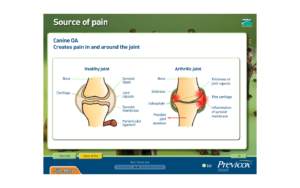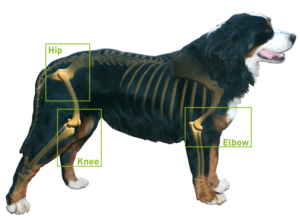
Arthritis is very common in pet dogs, especially as they get older.
What is arthritis and what causes it?
Arthritis is a painful disease of the joints. In dogs it is most common in the hips, elbows and knees. Osteoarthritis, or Degenerative Joint Disease, is the most common type in dogs – this is the result of excessive wear and tear on the joints that can be caused by a number of factors. Dogs can also be affected by rheumatoid arthritis, and septic arthritis due to infection.
Older animals are more prone to arthritis, due to the additional years of wear and tear on the joints. Obesity in pets is a growing problem, and this increases the chance of a pet developing arthritis at an earlier age. Some breeds of dog are more prone to arthritis, particularly large breed dogs due to the extra pressure on their joints. In dogs osteoarthritis can result from fractures or developmental problems e.g. hip dysplasia. Cruciate ligament rupture is one of the most common injuries in dogs and is a big cause of osteoarthritis in the knee.
Signs of arthritis
- Reluctance to get up, especially after resting.
- Difficulty with stairs or getting in and out of the car.
- Signs of pain e.g. crying out.
- Sleeping more.
- Limping and/or stiffness.
- Slowing down or not wanting to walk as far.
- Joint chewing or licking.
It is easy to put these signs down to ‘old age, but there is a lot that can be done to help these dogs to lead a more comfortable and active life.
What can we do to help a dog with arthritis?
Non medical options:
- Weight management. This is vital to successfully managing arthritis and weight loss alone in an overweight dog can cause a dramatic improvement in their mobility. We run free nurse weight clinics where the nurse will weigh and measure your dog regularly and advise regarding diet and exercise. There are a fantastic range of diets which are specially formulated to aid weight loss.
- Exercise. It is important that arthritic dogs undertake regular, gentle exercise. The vet may refer your dog for hydrotherapy, as this can be of benefit.
- Home management. Changes at home can improve comfort dramatically e.g. use of an orthopaedic foam bed, a ramp for getting in and out of the car, and use of non slip floor surfaces.
- Food. There are prescription foods e.g. Hills j/d, which is clinically proven to improve mobility in as little as 21 days. Ask one of our team about the best option for your dog. As part of our arthritis awareness campaign we are offering 25% off your first bag of Hills j/d during September and October 2018. Our Hills food range is covered by a palatability guarantee so if your dog doesn’t like it you can return it for a refund, and we also have an ongoing loyalty discount scheme.
- Alternative therapies. These include physiotherapy, therapeutic laser therapy and acupuncture. Our vets can advise as to which of these may benefit your dog.
Medical options:
- Many dogs show a dramatic improvement when put onto pain-killers/anti-inflammatories to manage their arthritic pain. The most common ones we use are NSAIDs (non-steroidal anti-inflammatory drugs), with both liquid and tablet forms available. It is important not to give your dog human medications, as some can be toxic for them.
Surgery:
- For some conditions surgery may be an option e.g. hip replacement or stabilisation of a ruptured cruciate ligament.
To book your dog in for a check-up with a vet please call 01803 606059 (Torquay) or 01803 834836 (Paignton), or book online. Our nursing team are also happy to advise about weight, diet, supplements and home management by phone, or in person.


